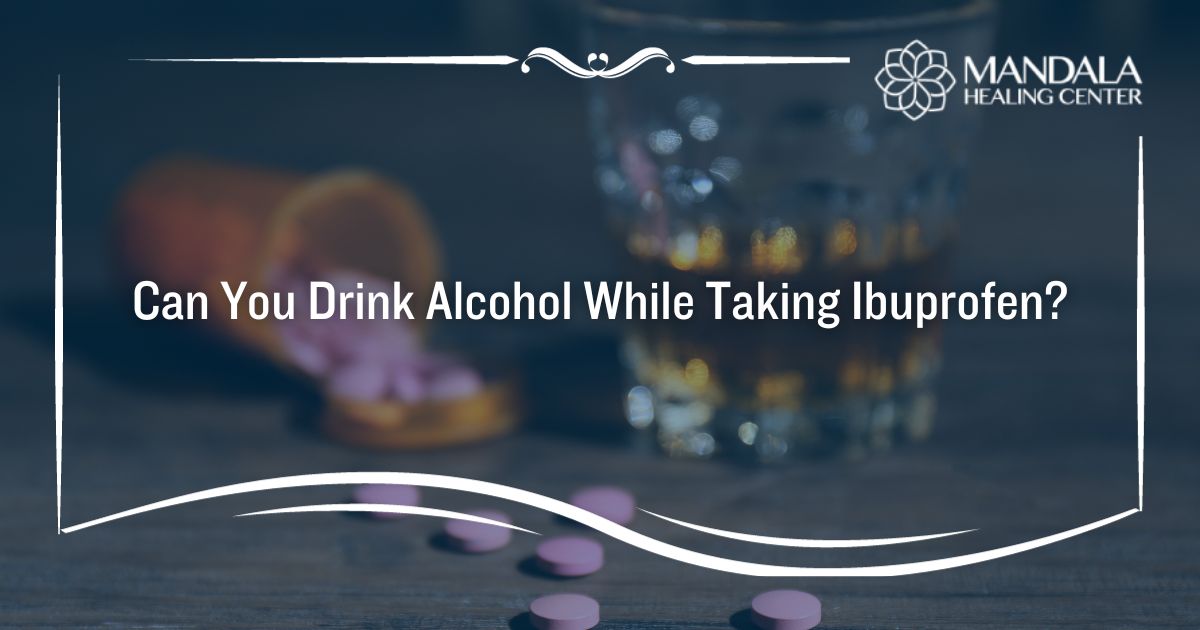Many people drink a glass of wine or have a beer to relax after a hard day at work. While drinking occasionally is fine, some individuals have a hard time controlling how much alcohol they consume. As a result, they might drink daily.
According to the National Institute of Alcohol Abuse and Alcoholism (NIAAA), 29.5 million people aged 12 or older met the criteria for alcoholism in 2021.[1]
If you find yourself drinking daily, you might not think of how the alcohol you consume can interact with over-the-counter medications. Unfortunately, a variety of medications can have serious effects when they are combined with alcohol. One of the everyday medications you might consume that can be dangerous when mixed with alcohol is ibuprofen.
Can You Mix Ibuprofen and Alcohol?
Ibuprofen is one of the most popular over-the-counter nonsteroidal anti-inflammatory drugs (NSAIDs). When you have a headache, sore muscles, or even a fever, you might take ibuprofen for relief. Oftentimes, people take ibuprofen so frequently that they never stop to consider what interactions it might have with other substances.
While it might be okay to have a single alcoholic drink when you take ibuprofen, drinking in large amounts can be devastating to your health. Keeping this in mind, it is not safe to mix alcohol and ibuprofen.
Drinking moderate or heavy amounts of alcohol while you are on ibuprofen can increase the side effects of the medication. Additionally, combining these substances long-term can put you at risk of a wide range of health complications. With that being said, you should always wait at least 10 hours after taking ibuprofen to drink alcohol.
What are the Risks of Drinking Alcohol While Taking Ibuprofen?
While ibuprofen might seem like a harmless medication, regularly mixing it with alcohol can have devastating effects on your health. Being aware of the risks of combining alcohol and NSAIDs like ibuprofen can prevent you from experiencing life-threatening symptoms.
Drinking alcohol while taking ibuprofen can increase your risk of the following:
Gastrointestinal Issues
Combining ibuprofen and alcohol can increase your risk of experiencing gastrointestinal bleeding and stomach ulcers. To explain, gastrointestinal bleeding happens when your digestive tract is injured or has developed a condition like colitis or ulcers. On the other hand, stomach ulcers are sores on the lining of your stomach or at the beginning of your small intestine.
Gastrointestinal bleeding can be life-threatening and is a serious risk associated with the combination of ibuprofen and alcohol. According to the NIAAA, “Consuming up to 1 drink per day increases the risk of gastrointestinal bleeding associated with NSAID use by about 37%.”[2]
The symptoms of gastrointestinal bleeding include:[3]
- Red, black, or tarry stool
- Blood in the toilet
- Sudden nausea
- Lack of appetite
- Stomach pain
- Vomiting bright red blood or something that looks like coffee grounds
Heart Problems
If you take ibuprofen frequently or in large doses, it increases your risk of experiencing heart complications.[4] The same goes for alcohol, which means combining the substances can result in life-threatening heart issues.
Heart-related problems linked to mixing ibuprofen and alcohol include:
- Increased blood pressure
- Heart attacks
- Stroke
- Heart failure
- Coronary artery disease
Kidney Damage
Because both alcohol and ibuprofen can cause kidney damage, combining the substances can significantly increase your risk. For example, a case study published found that two college students developed reversible acute deterioration in renal functioning after binge drinking while on NSAIDs like ibuprofen.[5]
Due to the risks of developing severe kidney damage, you should avoid drinking large amounts of alcohol while you are on ibuprofen.
Liver Damage
One of the most widely known risks of heavy alcohol consumption is liver damage. While ibuprofen on its own has little impact on the liver, combining it with alcohol can be incredibly damaging. Studies have found that using ibuprofen while drinking alcohol can increase your risk of experiencing liver damage.[6]
The symptoms of liver damage include:
- Stomach pain in the upper-right area of the abdomen
- Abdominal swelling
- Nausea and vomiting
- Yellowing of the skin
Finding Help for Alcohol Abuse and Alcoholism
If you suffer from alcoholism and frequently take anti-inflammatory drugs like ibuprofen, your risk of experiencing GI issues, heart complications, and liver or kidney damage is extremely high. Because of this, you should seek help for alcohol abuse with a professional addiction treatment center.
At Mandala Healing Center, we can provide you with the tools and support you need to overcome alcoholism. Contact us today for more information about our alcohol rehab program.
References:
- The National Institute of Alcohol Abuse and Alcoholism (NIAAA): Alcohol Use Disorder in the United States, Retrieved October 2023 From https://www.niaaa.nih.gov/alcohols-effects-health/alcohol-topics/alcohol-facts-and-statistics/alcohol-use-disorder-aud-united-states-age-groups-and-demographic-characteristics
- The National Institute of Alcohol Abuse and Alcoholism (NIAAA): Alcohol-Medication Interactions: Potentially Dangerous Mixes, Retrieved October 2023 From https://www.niaaa.nih.gov/health-professionals-communities/core-resource-on-alcohol/alcohol-medication-interactions-potentially-dangerous-mixes
- The National Institutes of Health (NIH): Symptoms & Causes of GI Bleeding, Retrieved October 2023 From https://www.niddk.nih.gov/health-information/digestive-diseases/gastrointestinal-bleeding/symptoms-causes
- Harvard Health: FDA strengthens warning that NSAIDs increase heart attack and stroke risk, Retrieved October 2023 From https://www.health.harvard.edu/blog/fda-strengthens-warning-that-nsaids-increase-heart-attack-and-stroke-risk-201507138138
- The National Library of Medicine (NLM): Acute renal failure following binge drinking and nonsteroidal antiinflammatory drugs, Retrieved October 2023 From https://pubmed.ncbi.nlm.nih.gov/1519610/
- The National Library of Medicine (NLM): Ibuprofen Increases the Hepatotoxicity of Ethanol through Potentiating Oxidative Stress, Retrieved October 2023 From https://www.ncbi.nlm.nih.gov/pmc/articles/PMC7921853/












